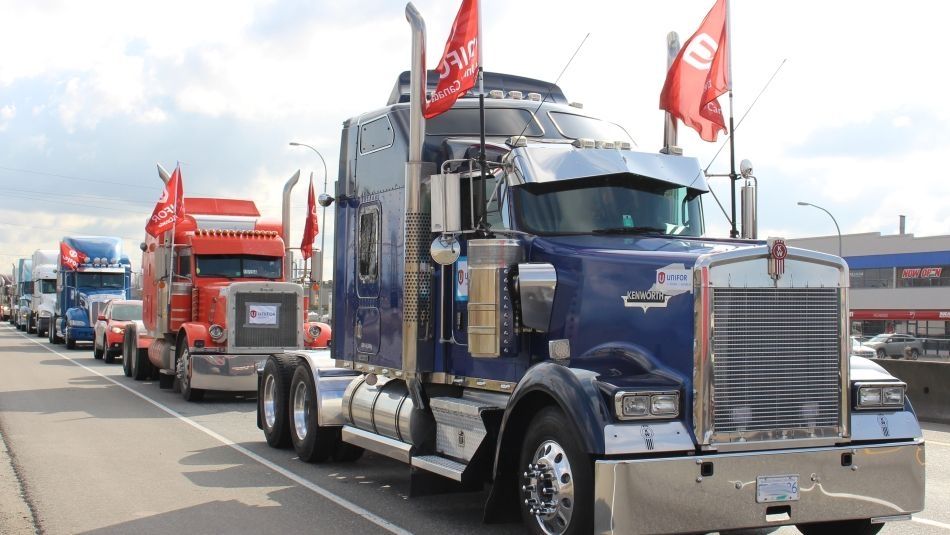
Share
Canadian transit and logistics systems offer one of the largest public procurement programs that can be leveraged to support Made-in-Canada production.
Procurement programs for transit buses, delivery vehicles, inter-city bus, and fleet services should all be prioritizing manufacturing production and jobs in Canada. This includes supporting local municipal procurement programs that outline made in Canada options and supports.
Trucking
Warehousing, trucking, and logistics is a sector that will be heavily impacted by tariffs. Around half of exports to the USA get there by truck and 70% of our imports get to Canada by truck.
Transportation makes up nearly 4% of Canada's GDP, but the employment is much higher than any other large sector by growth.
Trucking and logistics is also the largest single sector employer: 324,000 drivers.
Casualization has been a major source of concern for operators/drivers as American companies adjust their tactics to avoid unionization. Because of this, salary drivers have been replaced with usually mis-classified dependent contractors as Owner Operators.
With the ongoing threat to trade, it is important that Owner Operators are not left out of the income supports, especially those who are (misclassified) as dependent contractors.
Additional to income supports, Canada must ensure that "transport infrastructure" for increased East-West-North trade discussions include the assets available in trucking.
Supply chain resilience
Canada's statistics agencies and ministries should be focused on data collection and centralization of information on capacity availability for firms to know logistics options for different types of products and where they can be moved would support domestic supply chains.
Increasing speed, diversity of options, resiliency to Canadian weather/climate change, safe, and low-cost options will only come from larger research and data sharing programs.
One example is the Montreal data hub that allows easier planning of travel across the city focused on multi-modal travel, including private car share proving such information can be collected and used effectively.
Providing similar data support to logistics services would help expand investment in East-West-North transport of goods across the road system. Expansion of these services will act to offset the declining in jobs in transport related to the disruption in trade with the U.S.
Labour protections and unions are crucial for supply chain security and resiliency. Wage floors and sectoral bargaining similar to the B.C. port trucking sector can reduce wage suppression and casualization that only supports U.S. company profit growth. Free and fair collective bargaining help support working conditions and wages needed attract high skilled labour to these sectors and keep money in Canada.
Logistics
The government should ensure Canada Post's logistics infrastructure is sustainable for goods movement in Canada that is independent from foreign investment.
Made-in-Canada electric delivery vehicle procurement and charging infrastructure for Canada Post would ensure Canadian capacity for logistics transport industry production.
Charging stations
Charging station infrastructure should prioritize Canadian utility-owned programs that build weather-tested charging stations and buses.
Canadian charging station installations should support logistic services moving to Canadian made plug-in vehicles. Governments at all levels should support collaboration between transit systems for broad adoption of tested technology such as TTC bus charging stations.
Canadian Research and Development
Transport surveillance technology is mostly designed and developed by Chinese-based or U.S.-based technology companies. The data from these surveillance and AI is often held in American data centres. Legislation dealing with privacy, surveillance, and AI should be adapted to ensure data on Canadians that is collected meets domestic storage rules.
Research programs supporting the regulation of AI and surveillance services should seek to align more with European standards. Such standards could help Canadian and European technology development along safer and sustainable data services around logistics and safety.
Emissions standards for cross-border trucking have relied on American research programs and a focus on harmonization has pushed investment. Changes to the American emissions standards will have an impact on heavy truck and trailer regulations. Government industrial research arms will have to replace the loss of American regulatory research programs under their Department of Transport.
Unifor is Canada’s largest private sector union, with more than 320,000 members across the country, working in every major sector of the Canadian economy.
Unifor represents 21,000 members in the road transport sector, spread across over 150 bargaining units. Unifor members work in trucking and warehousing, courier, public transit, inter-city bus, armoured car, waste and disposal, taxi and airport limousine, and school bus services.


